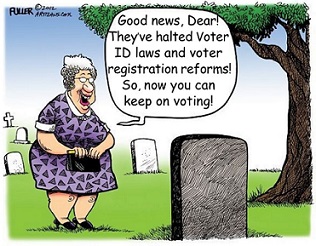
The left has been in a perpetual hissy fit since America rejected Hillary Clinton and I don’t expect it to change any time soon. Having pretty much exhausted their sinister plan to oust Trump through impeachment they have now decided to destroy America’s voting system.
Last month, Colorado’s legislature became the twelfth left-wing state to pass the National Popular Vote Interstate Compact (NPVC), an agreement among the states to circumvent the constitutional method of electing the president in favor of a national popular vote. The compact wouldn’t kick in until states with at least 270 Electoral College votes among them have signed on. Already fourteen states plus the District of Columbia have pledged to join representing 189 of the 270 electoral votes needed.
Lawmakers in fifteen other states have introduced pro-compact legislation. If it passes in just five of those states, the Compact would have 270 electoral votes. Each state that signs the agreement would require its presidential electors to obey the results of the national popular vote, not the results in their particular state. This means in essence that the vote you cast for the candidate of your choice doesn’t count.
A poll by Pew Research Center found that 55% expressed support for amending the Constitution to allow the president to be elected by popular vote, which doesn’t surprise me since the majority of Americans have no idea that the Founding Fathers established our voting system to give every state an equal say in the election of a president and prevent a few large states from controlling our elections.
The Compact seeks to effect a fundamental change in the presidential election in a way that exceeds the states’ constitutionally delegated authority. As the Court admonished in Thornton, 514 U.S. at 812–13, change, if it is to be undertaken, “must come not by legislation adopted either by Congress or by an individual State, but rather, as have other important changes in the electoral process, through the amendment procedures set forth in Article V,” which requires that an amendment be proposed by two-thirds majority in both houses and ratified by three-fourths of the states.
It also clearly violates the language of the Compact Clause in Article I of the Constitution, which holds in relevant part that “No State shall, without the Consent of Congress … enter into any Agreement or Compact with another State.” That’s a pretty strong statement. No penumbras and emanations here. Even among supporter opinions who push the Compact as constitutionally sound, authors admit that “read literally, this provision (Compact Clause, Article 1) would require all agreements between states to be approved by both houses of Congress and to be signed by the President before coming into effect.” “Read literally.” What other way should a law be read?
Outside of the question of constitutionality, however, there are also a number of public policy reasons that such an amendment would be detrimental to America’s voting system.
The winner-take-all system for electoral votes reduces the possibility of a recount since popular vote totals are often much closer than the Electoral College totals. In fact, former FEC chairman Bradley Smith points out that “recounts may have been necessary in as many as six presidential elections since 1880, if a national popular vote system had been in place. That’s nearly one out of every six elections” Can you image the turmoil that would exist if a candidate challenged every precinct, in every county, in every state of the Union.” It would result in protracted litigation and confusion, delaying the final resolution of a presidential election, and exacerbating the exact “problem” that NPV claims to be solving.
Provisional ballots could also lead to an extensive complex battle that could further delay and confuse the results of a presidential election. Federal law requires provisional ballots for all voters whose eligibility is called into question or who are unable to cast a regular ballot at the polling place because they are not on the list of registered voters.
Another unforeseen consequence of the NPV is that the plan would encourage voter fraud. Currently, a fraudulent vote is counted only in the district in which it was cast and therefore can affect the electoral votes only in that particular state. Under the NPV, however, vote fraud in any state would affect the aggregate national vote. This prospect is even more worrisome when one considers how much easier it is to cast fraudulent votes in strongly partisan neighborhoods and one-party districts where there are no (or few) members of the opposition party to work as election officials or poll watchers.
It is clear to see that losing two elections to the Electoral College has driven some on the left to embrace radical, nonsensical solutions. But regardless, these people cannot overcome the truth of what the Constitution does and does not allow. And while they are free to work to amend the Constitution, until such time, they must respect the rule of law and accept the results of elections.
Popular vote strikes directly at the Founders’ views of federalism and a representative republic that balances popular sovereignty with structural protections for state governments and minority interests. The Electoral College has provided orderly elections for more than 200 years, allowing a stable transfer of power of the leadership of the world’s greatest democracy. As former Federal Election Commission Chairman Bradley Smith says, “We tinker with our success at our peril.”
Source: Still Sore From 2016, Democrats Ignoring Constitution To Pursue National Popular Vote By Kyle Sammin, Esquire, The Federalist; Why the National Popular Vote Compact is Unconstitutional, Norman R. Williams, BYU Law Review; Destroying the Electoral College: The Anti-Federalist National Popular Vote Scheme, by Hans von Spakovsky, Election Law Reform Initiative and Senior Legal Fellow, Heritage Foundation

